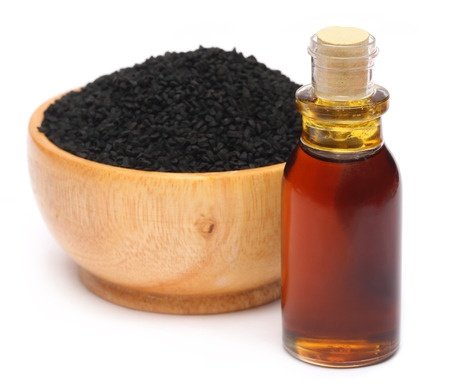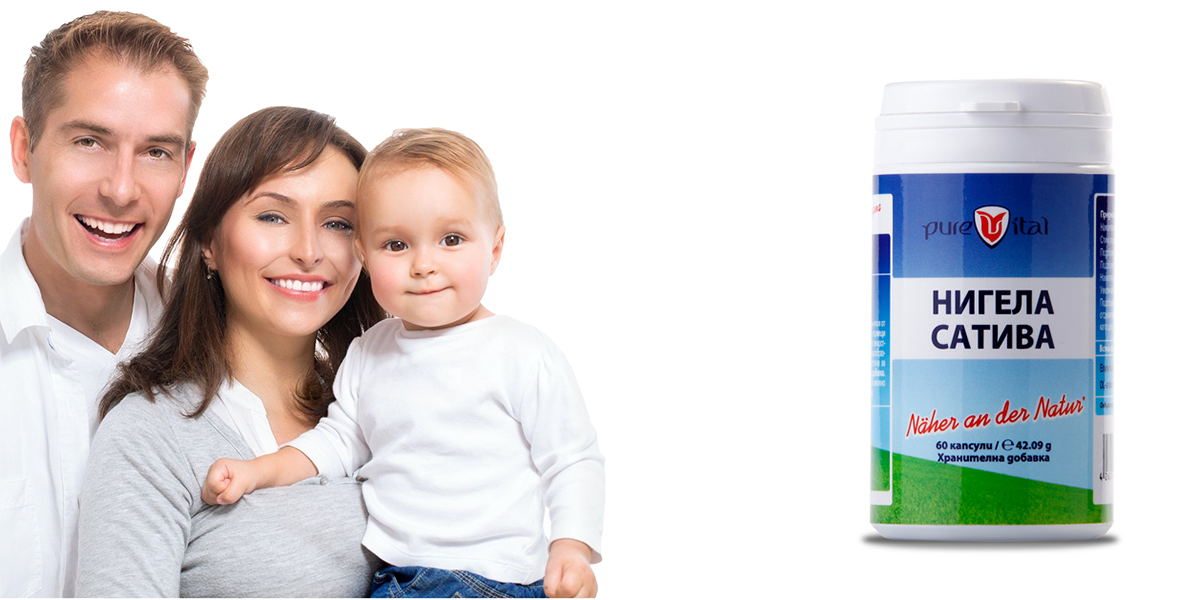The recommended daily dose contains:
- Nigella Sativa (oil) 1000,000 mg
- Vitamin E (D-alpha-tocopheryl acetate) 10,000 mg
Nigella Sativa (oil)
Egyptian Nigella Sativa is a product used since ancient times. It was even found in the tomb of Tutankhamun, which shows its importance in the medicine of Ancient Egypt. Nigella Sativa is black cumin oil.
Modern scientific research shows the content of more than 100 active ingredients that are responsible for the unique properties of Nigella Sativa. They determine the positive effect on the respiratory, circulatory, digestive, excretory and immune systems. A very good effect is observed in bronchitis, asthma, various allergic conditions. Black cumin also increases lactation in nursing mothers and helps with fungus. The strong anti-inflammatory effect determines its use in rheumatic and cold diseases.
Nigella Sativa oil is a powerful immunostimulant, which also has a very good effect on various skin diseases - acne, psoriasis and eczema. The plant has a proven antisclerotic and vasodilating effect. And, among other things, it is a strong antioxidant that destroys free radicals in the body and fights malignant changes in cells. The strong antioxidant and anti-inflammatory properties are due to the compound thymoquinone, not yet discovered in any other plant species. It affects cancer cells in three different ways: it can stop their uncontrollable division, stop metastases, reduce angiogenesis, as well as trigger apoptosis of altered cells.
An ancient Arabic parable tells of a man who was very ill. When he consulted a friend about how to treat himself, he received the following advice: "Take Nigella Sativa - in it lies the cure for all diseases except one." "Who is she?" asked the patient. "Death," replied the friend.
Nigella Sativa is an annual herb native to Southwest Asia. In the past, Nigella Sativa has been one of the most affordable and preferred forms of health maintenance.
History preserves many testimonies of the healing properties of Nigella Sativa. Nigella sativa seeds and extract are still widely used for medicinal purposes in Asia, the Middle East and Africa.
Traditional uses of Nigella Sativa include treatment of respiratory diseases, stomach and internal diseases, kidney and liver function, stimulation of the immune system. Nigella Sativa seeds are used in diseases like asthma, bronchitis, rheumatism and related diseases, allergies, cough, colic, headache etc.
The wide application of Nigella Sativa is due to the fact that, in addition to bread purposes, it can also be used as a spice. It is used in baking - for sprinkling pasta products, as well as as a seasoning for salads. The crushed seeds can also be placed in alcoholic drinks, to which they give a pleasant aroma.
|
Vitamin E (D-alpha-tocopheryl acetate)
Vitamin E is best known as a fat-soluble "free radical scavenger." Just like vitamins A and C, it protects the body's cells against aggressive oxygen compounds and toxins in the environment. Vitamin E can thus delay premature aging and prevent cell damage leading to disease or even cell degeneration. Due to its protective effect, vitamin E, which in the language of chemistry is called D-alpha-tocopheryl acetate, is widely used in cosmetics. It also plays an important role in protein and fat metabolism. Vitamin E supports the functioning of the cardiovascular system in two ways. First, it helps reduce "bad" cholesterol, and thus has a positive effect on blood vessels. Second, it prevents red blood cells from sticking together and thus improves blood circulation. Since vitamin E also has an anti-inflammatory effect, it can help relieve rheumatic pain. Vitamin E is formed exclusively in plants and starts from there along the food chain. Signs of vitamin E deficiency are skin problems, muscle weakness, degeneration and a higher susceptibility to infections. Supplementing the daily diet with vitamin E can be conveniently and easily implemented through nutritional supplements.
|




There are no reviews yet.